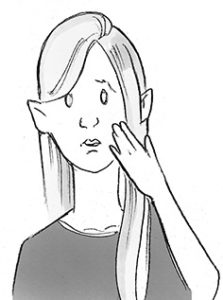So … we’ve made it at last! All the way through Vanessa the Wonder-worker together, and I hope you enjoyed my additional thoughts and reflections here about what I was thinking of and how it worked out.
Two last observations that I couldn’t find a good home for. Both of them really touch on that issue of how we interact with a secular — and sometimes skeptical — world.
Photini lets her hair down
 Photini’s little story goes on along in the background, but I liked the way it wound up. She has been having a time of it at school with a schoolmate that is downright hostile to her faith. Photini’s responses don’t always do her credit, so there is something refreshingly genuine, I think, about her finally just losing it. That’s not to say that we ever want our kids to think that fighting solves problems, but just between you and me, sometimes it’s better to lose your temper and know you’re a sinner than affect a pious frostiness and think you’re a saint.
Photini’s little story goes on along in the background, but I liked the way it wound up. She has been having a time of it at school with a schoolmate that is downright hostile to her faith. Photini’s responses don’t always do her credit, so there is something refreshingly genuine, I think, about her finally just losing it. That’s not to say that we ever want our kids to think that fighting solves problems, but just between you and me, sometimes it’s better to lose your temper and know you’re a sinner than affect a pious frostiness and think you’re a saint.
And when Photini and Tina share a moment together just as children, they can stop being combative and haughty. When they are just two girls who are vulnerable and a little bit frightened, Photini can finally find the humanity in Tina. And then, she can perform a little act of kindness that isn’t moralistic or patronizing.
“So the principal sent Ernestina and me outside, and we had to just sit by ourselves while they all yelled at each other in his office. There was no one else there, and the little girl just sat down and said, ‘I hate you.’ … But she said it like she didn’t even mean it — like she was just saying ‘Hello’ or ‘How are you?’ So I said, ‘I don’t hate you.’ And then I sat down in the chair nearest to her, because the grown-ups were talking very loudly, and we didn’t know what was going to happen.”
“And that was all?”
“Pretty much. After another couple minutes, she asked me if I was going to keep praying for her, and I said ‘yes.’ She wasn’t looking at me, but she seemed to think about it for a while, and then she said, ‘Okay.’ And we didn’t say anything else.”
When Photini unbends for once, Tina is able to see the compassion that we hope Christians are known for. You have no idea what this little girl’s story will be, but perhaps by being a good person who is also a Christian, Photini has done a little to combat all the negative words and impressions Tina has. Unfortunately, these days defeating the stereotypes people have of Christians is an important part of the battle.
Photini had in mind some kind of dramatic resolution to the story. But by just being a normal person who treats others decently, she might be doing more than she knows.
Saving James by risking it all
So it looks like Vanessa won after all. She certainly won the bet — if the new Miracle of the Geese doesn’t count, what would? But also, she managed to break through James’ iron defenses and get him to at least think about what it would mean to take up his cross and make his peace with God. When a person admits that possibility for consideration, even for a second, it can make a great impact on their perspective.
 Vanessa managed a breakthrough, but how did she do it? Not on her own terms, exactly. Not by lecturing James, or arguing with him. Not even by praying, talking to him about miracles or telling him about something that happened to her personally … although I think all of those things were necessary to pave the way. In her own way, Caroline Sharp might also have had a hand in his change of heart, by showing him the negative side of the “smart set” that he was trying to break into. Assuming that James was at least partly honest about his problems with Christianity stemming from a love of pure truth, how would it affect him to find out that worldly people are very comfortable with lying, if their comfortable view of reality seems threatened? Especially if it touches on their status or their wealth, as Caroline thought the Miracle of the Geese did.
Vanessa managed a breakthrough, but how did she do it? Not on her own terms, exactly. Not by lecturing James, or arguing with him. Not even by praying, talking to him about miracles or telling him about something that happened to her personally … although I think all of those things were necessary to pave the way. In her own way, Caroline Sharp might also have had a hand in his change of heart, by showing him the negative side of the “smart set” that he was trying to break into. Assuming that James was at least partly honest about his problems with Christianity stemming from a love of pure truth, how would it affect him to find out that worldly people are very comfortable with lying, if their comfortable view of reality seems threatened? Especially if it touches on their status or their wealth, as Caroline thought the Miracle of the Geese did.
But ultimately, I think it was Vanessa’s act of self-sacrifice, coming at such a high cost, that got through to him. James saw on the video camera that moment of temptation and struggle that was so painful for Vanessa.
More than all that, though, one image was like an arrow in his heart: Vanessa, glittering and fabulous onstage, but her face showing the intense conflict going on inside. And then to see her turning the microphone over to some old woman that nobody knew. Giving away that chance to shine that he knew she wanted with all her heart. It was nuts — anybody would have thought so. But that wasn’t exactly true. It was selfless — the kind of thing a person can do when they empty themselves of everything except love. He had never been able to do that. He didn’t know anybody could.
These past weeks, Vanessa had shown him her fierce loyalty, her faith and love, and it had made him look at himself. He hadn’t liked what he had seen.
I think if you want to save a person — really save them — you may have to be prepared to suffer some terrible things yourself to do it.
It reminds me of the 1998 movie “What Dreams May Come.” In that movie, we see a married couple both before and after death. The movie posits a hereafter — a heaven and hell — more symbolic really than religious. All the same, it makes some points that I think come very close to an Orthodox Christian perspective, and one of the biggest ones happens when the husband realizes that his wife has suffered a terrible depression from the grief caused by the death of their children followed by the husband’s accidental death. Overcome by her suffering, the wife killed herself, and in the next life, she was in hell. In order to save her, the husband couldn’t just call on others; he had to leave heaven and go to hell in order to drag her out.
That’s the kind of thing I mean. Over the course of our lifetimes, we all will have people near and dear to us who need saving. We may even be the only ones who have a chance. We can certainly pray to them and talk to them, and do all the other nice things that come easy.
“The Harrowing of Hell” — A bishop recently pointed out to me that Christ doesn’t just take Adam and Eve by the hand like a child — he grasps them by the wrist so that nothing can pull them apart!
But are we prepared to do what Christ did for us? We see it so dramatically depicted at this time of year in the icon called the Harrowing of Hell. In our case, we have our own sins and temptations to do with as well — we need saving. But are we prepared to fight our own demons and, if need be, storm hell itself, if it is the only way to rescue someone else?
That’s the question I ask myself, and I’m not certain of the answer. I suppose that is what Lenten efforts and the life of prayer is about. You don’t know when your chance may come — your moment of truth. But if it does, will you be ready to reject all the world and follow Christ, even into Hades?
That’s the Christian life — not for the faint of heart.
I think I said that this second book — Vanessa’s book — ended up a bit darker than Queen Abigail the Wise. It was a bit more edgy and gritty. I’m almost sorry about that, just because I would like to offer light reading for young readers (and myself as well!). But I’m not sorry if it means preparing children for what it really means to be a Christian right now. These are such strange times, where most of us live in the illusion of prosperity and relative freedom. But if you cross the world — really stand up to it — you may find quickly how superficial all of that is. Christianity isn’t about having uplifting bumper stickers. It’s about being prepared to live a purpose-filled life, but also die to yourself in order to live in Jesus Christ.
That’s the core truth that we all try to make progress in, day by day. God willing, we will always try. In any case, thank you for coming along on this journey with me through Vanessa the Wonder-worker. Blessed Pascha season to all!
